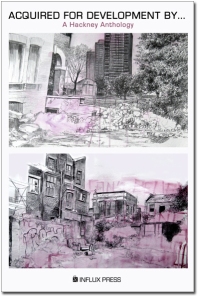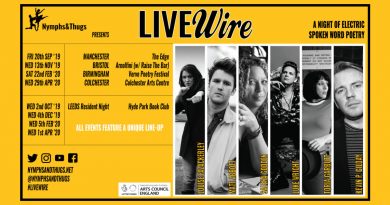‘Acquired for Development by…’ A Hackney Anthology
– Reviewed by John McGhee–
“In recent years Hackney has become synonymous with London Cool,” says Invest in Hackney. “Hackney – a crime infested craphole,” counters Your City’s Worst District. Until the new Overground line connected east London to south, my own preconceptions about Hackney lay somewhere between these two extremes.
Clapton. Hoxton. Dalston. Homerton. Haggerston. Shoreditch. Hackney Wick. Hackney Marshes. Stoke Newington. The polarities and paradoxes of Hackney’s districts are surveyed in Acquired for Development By…, an anthology of contemporary fiction, non-fiction and poetry from Influx Press. The stories in Acquired for… are inspired by and set in Hackney and their writers are Hackney citizens by birth or residence. Taken together, these pieces reveal an original cultural history and a leftfield psychogeography of the borough – and an unsettling blueprint for its future. The collection is structured by locality and there are strong indications it would be best read with a copy of the London A-Z at hand.
The non-fiction works particularly well, especially Tim Burrows’ ‘Dalston Kittiwakes’, a sprawling exploration of random connections between places and events centred on the Four Aces reggae club, demolished five years ago to make way for a multi-million pound regeneration of Dalston Square. Burrows avoids making his subject matter feel too insular and inward-looking, and instead chooses to meander through Scotland and Northumbria, wandering as far as Egypt, Jamaica and America’s west coast: a gloriously circuitous narrative. Nell Frizzell’s profile of the River Lea’s canal boat dwellers, ‘Rivers of Change’, is a charming, succinct documentary of a small-scale battle between boaters and the bureaucrats of British Waterways, of lives soundtracked by early morning ‘jaggering coots’. Natalie Hardwick does her best Louis Theroux impersonation for ‘Alevism and Hackney’, an enquiring, sincere portrait of Dalston’s Turkish community.
Slam and performance poets are well represented. Sam Berkson’s ‘Hackney Numbers’ mixes the urban genial with the urban ominous to great effect: kids, neighbours, booze, house parties and violence. There is a chance to revisit Molly Naylor’s sparky monologue Whenever I Blow Up I Think Of You, with two pertinent extracts reprinted here. In Siddhartha Bose’s ‘Wicklove’, memories of the ‘performed bohemia’ of a summer festival sizzle and tumble and Bose’s lines dazzle:
Chicken-shopped, corner-kebabed, glimmer dereliction, Hackney
Wick – chromatic – fizzes, bobs, pops in soap bubbles, like tube-
travellers on a plunkt escalator.
There is a haiku sequence, urgent like graffiti; perceptive flâneurs reconnoitring ‘Dalston Lane’ and ‘Dark Island: Wallis Road 09.03.11’; and a warm-hearted memoir of growing up between Vicky Park and the Murder Mile. There is much wit, darkness and variety in this poetic selection.
Within the constraints of their Hackney setting, the short stories and flash fictions manage to be wonderfully eclectic. At the heart of the anthology is ‘Tautologies’ by Gary Budden, a detouring commentary on identity, the passing of time and the self-contradictions intrinsic to living an art life in Hackney:
I took a certain uncomfortable pleasure in the knowledge that my lifestyle, or at least
part of it, would be considered by some as worthless and pathetic. Derided as left-wing
posturing, or the sad trappings of an adolescence that really should have been let go of.
The impact of passing time on pleasure-seeking lifestyles is also considered in Gareth Rees’ funny and sinister ‘A Dream Life of Hackney Marshes’. This story transcends its high concept – a man falls in love with an electricity pylon – to be a memorable take on the destabilising effect of ‘the pram in the hall’. In a similarly darkly comic style, David Dawkins’ ‘A Hackney Triptych’ comprises three twisty anecdotes that only pretend to be unconnected. Other pieces stray further from the everyday into the absurd. Andrea Watts’ ‘All Gone’ is a modern parable pivoting on a bizarre metamorphosis. Amongst the flash fiction, I most enjoyed Kieran Duddy’s ‘Demolition: Clapton Park Estate 1993’, a snapshot of a life-changing double towerblock blowdown.
Perhaps most ambitious are the three dystopias: ‘The Battle of Kingsland Road’ by Paul Case, ‘The Finest Store’ by Kit Caless and ‘2061’ by Ashlee Christoffersen. All three are entertaining, if somewhat broad, hyperbolic extrapolations. ‘The Battle of Kingsland Road’ documents a future clash between rival Stoke Newington and Hoxton militias through manifestos, memos and transcripts – more parody than serious post-riot commentary. I am a huge fan of the original The Twilight Zone and felt the class-and-consumerism satire ‘The Finest Store’ could have sat perfectly next to the likes of classic TZs like The After-Hours and The Fever. ‘2061’ cleverly plays off different interpretations of the word ‘estate’ (a tract of Council housing, or a slave plantation). Whilst its economic analysis is debateable, ‘2061’ commits fully to its sinister hypotheses, its chilling vision.
Acquired for… is a chorus of rich and diverse east London voices. The collection neatly pinpoints some of the most critical tensions in modern urban life – tradition versus innovation, the real versus the perceived, the modern versus the post-modern – and sees how these play out in a borough perceived as both lawless and cool.




Pingback: Review | Influx Press
Pingback: Stoke Newington Literary Festival 2012 « Sabotage
Pingback: Blog | Influx Press
Pingback: A Fiction Round-Up 2012 « Sabotage
Pingback: Review |